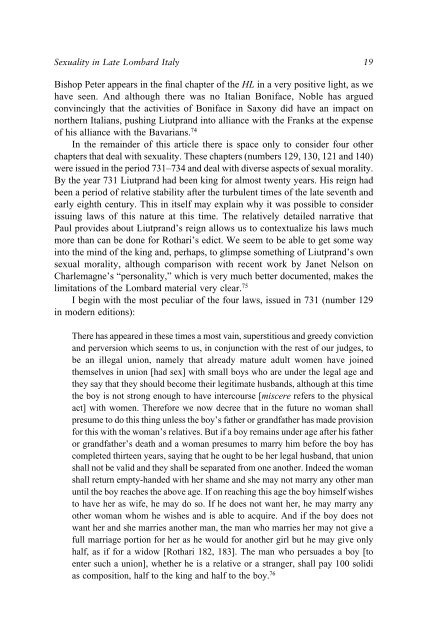Medieval Sexuality: A Casebook - Julian Emperor
Medieval Sexuality: A Casebook - Julian Emperor
Medieval Sexuality: A Casebook - Julian Emperor
You also want an ePaper? Increase the reach of your titles
YUMPU automatically turns print PDFs into web optimized ePapers that Google loves.
<strong>Sexuality</strong> in Late Lombard Italy 1911112342225672228910111232224567892022212345678930111123435678940111123222Bishop Peter appears in the final chapter of the HL in a very positive light, as wehave seen. And although there was no Italian Boniface, Noble has arguedconvincingly that the activities of Boniface in Saxony did have an impact onnorthern Italians, pushing Liutprand into alliance with the Franks at the expenseof his alliance with the Bavarians. 74In the remainder of this article there is space only to consider four otherchapters that deal with sexuality. These chapters (numbers 129, 130, 121 and 140)were issued in the period 731–734 and deal with diverse aspects of sexual morality.By the year 731 Liutprand had been king for almost twenty years. His reign hadbeen a period of relative stability after the turbulent times of the late seventh andearly eighth century. This in itself may explain why it was possible to considerissuing laws of this nature at this time. The relatively detailed narrative thatPaul provides about Liutprand’s reign allows us to contextualize his laws muchmore than can be done for Rothari’s edict. We seem to be able to get some wayinto the mind of the king and, perhaps, to glimpse something of Liutprand’s ownsexual morality, although comparison with recent work by Janet Nelson onCharlemagne’s “personality,” which is very much better documented, makes thelimitations of the Lombard material very clear. 75I begin with the most peculiar of the four laws, issued in 731 (number 129in modern editions):There has appeared in these times a most vain, superstitious and greedy convictionand perversion which seems to us, in conjunction with the rest of our judges, tobe an illegal union, namely that already mature adult women have joinedthemselves in union [had sex] with small boys who are under the legal age andthey say that they should become their legitimate husbands, although at this timethe boy is not strong enough to have intercourse [miscere refers to the physicalact] with women. Therefore we now decree that in the future no woman shallpresume to do this thing unless the boy’s father or grandfather has made provisionfor this with the woman’s relatives. But if a boy remains under age after his fatheror grandfather’s death and a woman presumes to marry him before the boy hascompleted thirteen years, saying that he ought to be her legal husband, that unionshall not be valid and they shall be separated from one another. Indeed the womanshall return empty-handed with her shame and she may not marry any other manuntil the boy reaches the above age. If on reaching this age the boy himself wishesto have her as wife, he may do so. If he does not want her, he may marry anyother woman whom he wishes and is able to acquire. And if the boy does notwant her and she marries another man, the man who marries her may not give afull marriage portion for her as he would for another girl but he may give onlyhalf, as if for a widow [Rothari 182, 183]. The man who persuades a boy [toenter such a union], whether he is a relative or a stranger, shall pay 100 solidias composition, half to the king and half to the boy. 76













